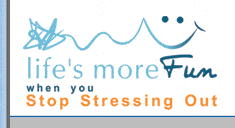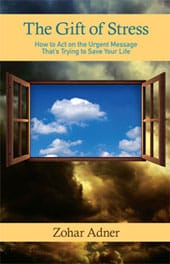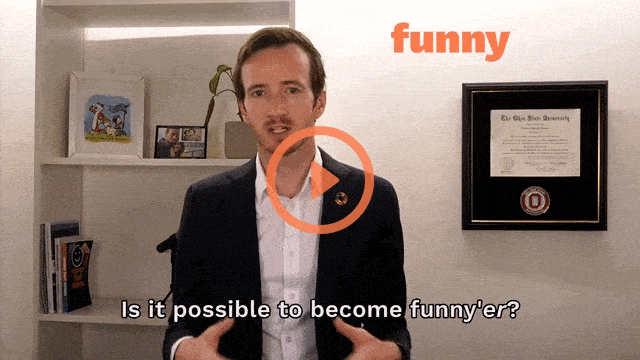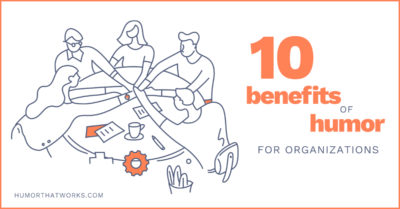Zohar Adner is a stress release coach and author of The Gift of Stress – How to Act on the Urgent Message That’s Trying to Save Your Life. I sat down with Zohar to talk about his new book, his work as a stress release coach and the role humor plays in stress release.

Highlights from our talk include:
- The Gift of Stress (0:35)
- Why We Suck at Handling Stress (5:50)
- Can You Become Stress-Free (9:40)
- The Seven Rs of Stress Release (16:30)
- The All Important Reminder (20:14)
- Humor as a Diffuser (27:15)
- The Stress of a Haircut (32:06)
For more on Zohar or his stress release work, check out:
- The Gift of Stress
(on Amazon.com)
- The Gift of Stress website
- Stop Stressing Out
- Stress and the City – Zohar’s Stress Blog
- Stop Stressing with Zohar and Michele – Zohar’s Radio Program
Zohar Interview Transcript
Drew: Welcome everyone to another installment of Humor Talks with one of the thought leaders in the humor area. Today we are joined by Zohar Adner, a stress release coach, the author of The Gift of Stress – How to Act on the Urgent Message That’s Trying to Save Your Life, and an all around great guy. Welcome Zohar.
Zohar: Thank you, Drew, it’s a pleasure to be here.
Drew: I wanted to first start talking about something I know you’ve been working on a lot lately and that’s your book, The Gift of Stress. I could summarize what I took from the book, I thought there was a lot of great stuff in there, but I figure you’re the one that wrote it, you might have some good insight as to what the book is about.
Zohar: Sure. Basically, my concept of stress is that it’s an urgent message indicating that something important to you is threatened or absent, and that message will just keep getting louder and louder until you take action on it.
This is coming from a place of protection and concern for you–that’s all the body is trying to do. It’s saying, “Hey, let’s help each other out. You’ve told me this is important, let’s take action on it.” And until you hear it, it will get louder and louder, and that’s why stress has a really really big impact on our lives and body: the way we interact with each other and the way we feel, and is related to a lot of disease.
Drew: It sounds likes it’s like the engine-light in your car. It may be blinking at first when it comes on, a notification your body is saying that something’s not right here.
Zohar: Yes, and then it becomes a really loud alarm, and then a blaze.
Drew: Like your engine on fire.
Zohar: Yes. And so my whole concept is that instead of dealing with all the symptoms it’s causing, this blinking light, what can I do to get rid of the reason behind the light. If it’s a car alarm making noise, don’t focus on what can I do to quiet it or muffle my ears? Instead, how can I pay attention to what it’s trying to tell us, and then it’ll shut itself off.
To me that means you are no longer stressing out about the same thing, because you’ve dealt with that issue and can move on. And stress is happy because it feels like it’s doing it’s job, and I know I’m anthropomorphizing stress, but it’s there to help, so let’s listen to it. That’s what the book is about.
Drew: I think one of the key takeaways for me is the definition you give for stress. What is that definition and how did you come up with it because it’s a little different than the Webster’s Dictionary definition.
Zohar: My definition of stress is that stress is a reaction that commonly occurs when the current situation doesn’t match the ideal version of that situation. And I came up with it because when you talk to people about what they consider stress, there are a lot of symptoms that get listed or situations. “This person’s stressing me out.” “My muscles get tense.” “My heart beats faster.” “I can’t sleep.”
Those are really just symptoms. That wasn’t working for me when I was trying to do something about it because you have no idea what the problem is. By working with people and thinking about it, I came up with this definition. And what it does is break things into very distinct categories that you can now look at and control.
Control is a big thing about stress. You feel stressed a lot of times when you don’t have control, and here’s a way to get it back.
Drew: I think it’s a great way to shift focus from the symptoms of stress to the root of the problem.

One of the passages that really resonated with me was the idea of control. You say, “We always have the power to create our ideals, change them as we see fit and release them when they no longer benefit us.” I think that’s such a strong thing to take note of: you think about stress; stress is a mental thing. We have the ability to control what stresses us out and what doesn’t.
Zohar: The first part of the definition talks about how stress is a reaction. Our body is reacting in different ways. It’s either sending messages or thoughts, to our muscles–all different parts of our bodies. It affects our hormones and our nerve endings it’s all over the place. There’s no part of our body that is immune to stress.
The reason why we’re stressing out is that it used to be that thousands of years ago, when we were being chased by something that was going to eat us, we’d get stressed and we’d either live or die. And if you lived, the threat went away and you calmed down and you were fine. And these interactions happened for just a couple of minutes.
Our bodies and lives have changed a lot, but our bodies haven’t caught up to modern day living. So what’s going on now is that it’s more than just “Am I going to live or die, am I going to be eaten right now,” it’s “traffic is bothering me” and things like that.
These are ideals that we created through society. The way we were born, what we’ve read, our friends, our family, they all shape where our ideals come from. And these ideals are based on our values and what would you like those to be in our life.
So when you take a moment to figure out, “what’s going on here? what are my values?” stress is going to tell you. Whether you are conscience of it or not, it’s going to tell you, “Hey you said this is important.”
We can take a look at them and say “These are my ideals, great!” And now that you’re aware of these, you now have control over things at a level you didn’t have before, so what can you do about it?
Is it working for you? Is it not? Can you find a substitution for this, or is it no longer necessary? Is it something you came up with when you were younger, or something someone told you about and upon further evaluation you realize it doesn’t work for you. Having that awareness and that kind of approach towards what’s going on with stress is huge, absolutely huge.
Drew: Does that mean that if you get aligned with what you want to do and you’re happy with where you’re at, it’s possible to live a stress-free life?
Zohar: Well, if you live in a vacuum. I call the book “The Gift of Stress” because it tells us more and more about ourselves. That to me is part of the reason we are here, to learn more about ourselves.
If you are able to reach the point where there is no stress, life goes on and you continue interacting with people and somewhere along the way, something probably isn’t going to jive with you. So that will have this stress reaction and you get to evaluate it, “is this working for me or isn’t it?”
The better you get at going through this method, the quicker you’re able to evaluate it and deal with the issue. You’ve heard the message and you’ve learned more about yourself and when you’re done with that, you can move on and your back to not having stress.
Drew: I think that’s a great point. One of the things you mention in the book is eustress, in terms of the productive stress, the feeling that you have that helps you be productive.
In some of areas of business they talk about creating that sense of urgency so that you don’t fall into the trap that work expands to fill the time that you have allotted for; so you don’t give yourself the entire year to do a single thing because it will take an entire year to do it.
Instead, you have some deadline to keep you productive. You definitely reference that. So maybe it’s not always going to be a stress-free life because part of being productive is continuing to work and continuing to grow.
Zohar: A lot of people enjoy having some stress in some situations because they feel it motivates them.
Now the thing with eustress is that it releases the same kind of hormones as regular stress and it’s just a matter of how long it’s out in your system because after awhile it starts causing physiological damage. It takes a little awhile, but you can’t always be doing that.
For me, when I work with people, I ask them, “Is this part of your life (lets say your office work), is this stressful to you? Is this something you want to do something about?”
Sometimes people say yes, sometimes people say no. If it’s not something you want to do something about, that’s fine. Then it matches your ideal.
It may be difficult, there may be contention, there may be challenge there. And there’s nothing wrong difficulty or challenge. They help us build, they help us grow, they help us deal with different kinds of situations.
It’s when people are at the point of “this is really stressful and I don’t want it.” That’s when there’s an opportunity to do something about it and here are the tools that are going to make that change possible–that’s that great little window of opportunity.
Drew: I have to admit I am a little upset with you as an author because your book not only makes you think about stress and re-evaluate your current situation, but it also makes you do work.
The whole second part of the book is really about using some of these principles you have, getting you to think about your own life and think through things to figure out yourself how you’re going to come out and reduce some of your stress.
It’s obviously great from a book perspective but at the same time it’s not a passive thing you’re going to read and it’s going to magically change your life; there’s actual work involved on your part.
Zohar: The stress is doing work on your body anyway; your body is doing something. So the quesiton is what do you want it to be doing.
I give people the opportunity in the second half of the book, when they’re ready for it, the things they can do that can make a difference and impact on their life. When you’re going through this, you’re going to be doing it because you want to, not because someone is putting outside pressure on you.
Stress is your reaction, someone else can’t stress you out. You have to accept what kind of behavior they have in that situation and determine “you know what? I find that stressful.” If you’re stressed, someone else next to you doesn’t have to be stressed. They may pick up on your stress and start reacting in empathetic way, but that’s them choosing to be empathetic and opening up to that and being more sensitive to it. And if that works for them, that’s their choice.
But we also talked about stress and how it motivates us to do stuff. In the book, I talk about dessert. When you are going to get dessert, do you get all worked up about it? Or is it something like “I feel like some dessert, so i’m going to go up and get some.” I don’t procrastinate on it. It just happens. There’s some kind of inner motivation or desire that comes from that, and that’s a big thing missing for some people that feel like they have to have this stress in their life or they’ll just sit on their butts and not getting anything done. So find out what kind of dessert you like–what’s going to really help you get some desire about that task you put off or makes you feel like you need that outside motivation.
Yeah, you know what? I am giving you a little extra work, but it’s going to feel so much better.

The interesting thing is that this might go contrary to things you’ve been thinking for so long. People might say you’re crazy because you like paying your bills or cleaning your house. But maybe you’ve found that you like it.
Maybe you find it calming and like being aware of what you spend and that it helps you be more careful about what you’re putting your money towards. Whatever it is, it’s engaging you in your life, and that’s huge.
Drew: I think that’s a great point you emphasize throughout, really identifying what’s specific to you.
Drew: As you mentioned, one thing that causes stress to you may not to another person and that’s actually the first R in your Seven Rs of Stress Release, to Recognize. What are the Seven Rs of Stress Release?
Zohar: The Seven Rs of Stress Release are a method I came up with about 5 years ago where it breaks down any kind of situation and helps you get clarity on what you want, where you are and what you can do about it to bridge the gap (the gap is one of the four diffusers we can get to later).
If you’re stressed, your ideals aren’t matching your current situation. You don’t want things to be the way they are, so there are some issue there and that tension caused is being expressed with stressed.
The Seven Rs break down to following: The first one is Recognizing how you want your ideal. The second one is Reviewing your current situation. The third one is Revealing overlaps. So now you’ve revealed what you want and what you have. Now what’s working for you and what isn’t. This way you know where to focus.
The fourth one is Releasing your outdated ideals, your ideals that are holding you back. What do you no longer need to work towards, what are you holding on to that’s not working for you.” The fifth one is Raising the likelihood of actually getting those ideals we have left over. This is the more typical work of taking action steps to move forward.
Let’s take the example of losing weight. The first R would be, ideally, what would you weigh and how would you be feeling about yourself in the process. The second would be what do you weigh now and how are you feeling about yourself now. Then we look at what’s working for you, what isn’t and also becoming aware of what people are supporting you, which ones aren’t. And you’re getting more clarity on the reality of the situation and what’s working for you and what isn’t. Then we evaluate why you want to lose this weight, and why don’t you. Where is this desire coming from? Are you OK with it? Do you need to lose as much weight as you initially thought?
This way your getting clarity on the work on have to do, which is stage 5. Then you set up your plan. Is it a diet, or exercise? Who are you going to speak to? What are you going to eat? This is the problem-solving that a lot of people are more familiar with.
Then you have the sixth part of Reminding yourself of what you have to do achieve your goals.
And it’s this reminder thing that a lot of people overlook but this is the thing that helps anchor you into that moment and that progress so you don’t slide back into your old behaviors and habits. It helps you stay with the progress you just worked five steps for.
Drew: The remind yourself is one that I think is super-important. Each of them are, especially being detailed and quantifying what you want to do as opposed to keeping it vague like “I want to lose weight” versus “I want to lose 10-pounds over the next three months.”
I think the remind yourself is so important and also where you can have some of the fun and where you can bring in some humor–thats what I tend to do a lot when reminding myself .
I went through this process with waking up. I like to hit the snooze button and reminding myself by setting an alarm or ringtone that is less annoying than the annoying “rehn rehn rehn” sound, setting an alarm that is more joyous.
I have a couple of different songs that remind me that I want to wake up because it’s an entirely new day and there are plenty of new opportunities, as opposed to the mindset that the alarm is interrupting my sleep and is a nuisance. It’s like it’s a great thing I have this alarm clock because now I can get up and hit the day running.
So I think reminding yourself is helpful, and then when it’s tied to a trigger or motivator that is positive, it can help you more likely succeed, whether it’s waking up or exercising or whatever it is you’re triggering.
Zohar: Absolutely. That’s a fantastic example. I used the same thing for a person who was on the phone a lot. She’d get upset when people would call so we changed her phone ringtone. Your alarm is perfect.
To continue the weight loss thing, you can ask yourself where you are most vulnerable. Maybe it’s the fridge, so you post a little note on it that says “hey, do you really want that?” And you find out. It’s a question you ask of yourself right at the moment.
Somebody was talking to me about how they want to take the stairs more than the elevator. I said “Great, is there some kind of sign you can put up that only you can see that will remind you of your choice when you see the elevator?”
It’s these kinds of things that can help just in that moment. And I prefer physical things. Something that engages the senses. Particulary visual, auditory or tactile. They’re usually the easiest. Of course if you can find a way to create the smell of cinnamon and use that as a reminder, that’s great too.
Drew: You can do the same thing with desktop backgrounds, ringtones, moleskin notebooks, stuff on your refrigerator, etc.
I know some people put something on their wrists so that every time they say a certain type of statement they have to change it to the other wrist. It’s just a pyhsical manifestation of what it is they are trying to change which I think it pretty cool.
I think it’s a great book, especially when you’re ready, it can be a big help. But you are also a stress release coach and author of stopstressingout.com.
What is it that a stress release coach does? Do you go out and, if someone is causing stress in someone’s life, you take them out? What is it that you do?
Zohar: That’s more of a stress-release hit man :).

I think there’s one part of people that do just want to get rid of stress, and when you’re in a really bad place, maybe that’s the best course of action. If you’re going through some kind of panic or anxiety and you can’t just focus, then, yeah, let’s focus on doing something that will bring you back to a calmer state–some breathing or exercise, something fun to laugh at or with that’s going to improve your mood (another one of the diffusers that we mentioned).
But with stopstressingout.com, I have a blog; a newsletter; I’m starting my own radio show and a few other projects to engage with people 1on1; I do groups, workshops, and private coaching to help them. Clients come to me and tell me that stress is an issue, so we take a look at what might work for them.
When you focus on activities, we start with the recurring ones. 90% of stress in our lives is recurrent. Things that happen over and over again that we just haven’t taken care of. Maybe it’s a particular relationship, maybe it’s a boss.
We take a look at those things because we know they’re going to happen. And by taking care of them, it’s going to improve everything else and you’re going to be better able to handle those one-off occasions of stress. That’s the first place I start with people, with what’s going on.
When we’re able to break things down through the diffusers and the Seven Rs of Stress Release, that’s where the progress is made. Things get clear very quickly because clients are talking to someone that asks the right questions and they go through the process quite naturally. It doesn’t feel like work, it feels like a conversation. A really insightful, eye-opening conversation.
Which is the way it’s supposed to be. And the first time you go through the book, you might think “I’m doing some work.” But once you’ve done it a few times, it’s just easy. And you’re excited: “What am I going to learn about myself this time? How am I feeling about this? Awesome, I’m feeling like progress is made, it’s giving me extra encouragement and incentive and motivation to move on and act on this stuff. And life is good.”
Drew: One of the things you talked about is diffusers. Something that is near and dear in my heart is humor. What role do you think humor plays in either being a diffuser or helping to combat the stressful world that we live in.
Zohar: The first diffuser is narrowing the gap between your ideal and your current situation. To narrow that gap, to use the weight-loss example, the closer you are to your ideal weight, the less stress you’re going to feel.
The second diffuser is your attachment to your ideal. If you’re feeling more detached about weight loss, maybe you don’t care about losing as much weight–if it’s not important to you there’s going to be less stress. If you care more, there’s going to be more.
The third one is familiarity with bridging the gap. If this is something you’ve done a bunch of times, then you know how to deal with it and it’s not as big of a deal. Sweet, lets find more things that you’re aware of and make more connections. This could be a time for some humor.
But the most obvious connection to humor is the fourth one and that’s improving your mood. If you improve your mood then things don’t stress you out as much, and that’s physiologically proven. Laughter itself, whether it’s fake or authentic (our body can’t tell the difference) has so many healing properties: it boosts your immune system, makes you feel great, releases endorphins. Everybody likes to laugh and when you’re laughing, you’re feeling better.
So as far as diffusers and humor, I normally associate it with the fourth one, mood. But it has side benefits and some tangents, like familiarity with making connections. The more familar you are with things, the quirk there is that it’s more humorous. That’s how humor works: you take something familiar, add a little twist to it, and it’s like “oh yeah” and you feel good about yourself.
I find that the whole process is made easier with humor and I like to apply it in liberal doses with a dose of perspective and not holding anything too sacred. Because if you’re holding on to these ideals and rigid attachments and it must be “this way,” there’s no room for humor and there’s no room for adjustments.
Humor really challenges what you’re really holding on to. It helps to have the mindset of nothing is sacred, everything can be challenged, but nothing has to be tossed out. If you can’t challenge it, then you really are a victim of it and you don’t have control over it. And that’s really important to be able to look at.
Drew: You make some great points, certainly with just boosting your mood. We’re heading towards the tail end of the call. With that tangent of humor, can you share any humorous stories from your stress release coaching or from writing the book?
Zohar: Well one of the biggest ironies was that writing the book was one of the most stressful things I’ve done by far. I was laughing about it during the process and I can laugh about it more now, but it’s true. Writing is not something that I am really familiar with or do naturally, but it is something I care about a lot. And I definitely had to use liberal doses of humor to get through the process.
As far as a humorous anecdote, people come to me with stressers that are really serious and big concerns to them, and I’m with them and understand it, but the funny thing is that afterwards we sometimes laugh about it because everything has a humor component to it. You get some perspective on it and you’re no longer stressing out about it and when you’ve got that, everything feels much better. Everything has that humor component to it.
Sometimes people come to me and have come to me really stressed out about their hairstyle–should they cut their hair or not? People who’ve lost 50 pounds and stress out about those last 5. After a while they realize they lost 50, they’re great. That’s something we’ll end up laughing about.
Drew: That’s true. The hair thing–I sometimes joke, and it’s partially true, that I have a minor identity crisis any time I go to get my haircut. Do I keep the same haircut I’ve had for a long time or do I switch it up? What do I tell the barber? What do I need to say? How will it affect how I look? Ultimately I end up not caring too much because I figure I don’t have to look at my haircut that often; I see it maybe in the morning after showering but after that I don’t have to see it for the rest of the day, but I can see where some people would really be hinging on that. Some people stress about hair, some people stress about leading a multi-million dollar company. As we talked before, it’s all about your own perspective and situation.
Zohar: Exactly. Even just today I was hanging out with a group of people. Things were a little slow so I took out some juggling scarves. This is just juggling scarves in a room full of people and I was the only one that knows how to juggle. But people were so intimidated and stressed out about doing it that there was major hesitation. It tooks some brave people to say “OK, I’ll try,” and then people’s fears started breaking down. And it’s OK, there’s nothing at risk here.
I don’t even know how much your ego is tied up in this, nobody has any expectations of you being able to do it. It’s just about if you are willing to step up and try. Even just that, some people freak out about it. I get it, I have my own quirks, but it’s about being open to them and challenging them and being able to say, “maybe there’s a better way.”

Drew: Very rarely will you be in a life or death situation where the ability to juggle scarves will come into play…
Great, well thank you very much Zohar, is there anything else you’d like to point people to? Readers can visit stopstressingout.com for your coaching and find your book on Amazon or at thegiftofstress.com, but is there anything else you’d like to mention?
Zohar: Basically when you look through the site, the blog, or the book, if you have any questions, I am always open to helping people get clarity on an issue or on what’s going on. That’s the invitation to everyone. Check things out, be in touch.
Drew: Excellent. Thank you for joining us today and have a great day.
Zohar: Thanks, Drew. Great talking to you.
Note: This is the third Humor Talks interview, a series with some of today’s thought leaders on the topic of humor in the workplace. You can sign-up for the Humor Newsletter to stay up-to-date with new interviews.


